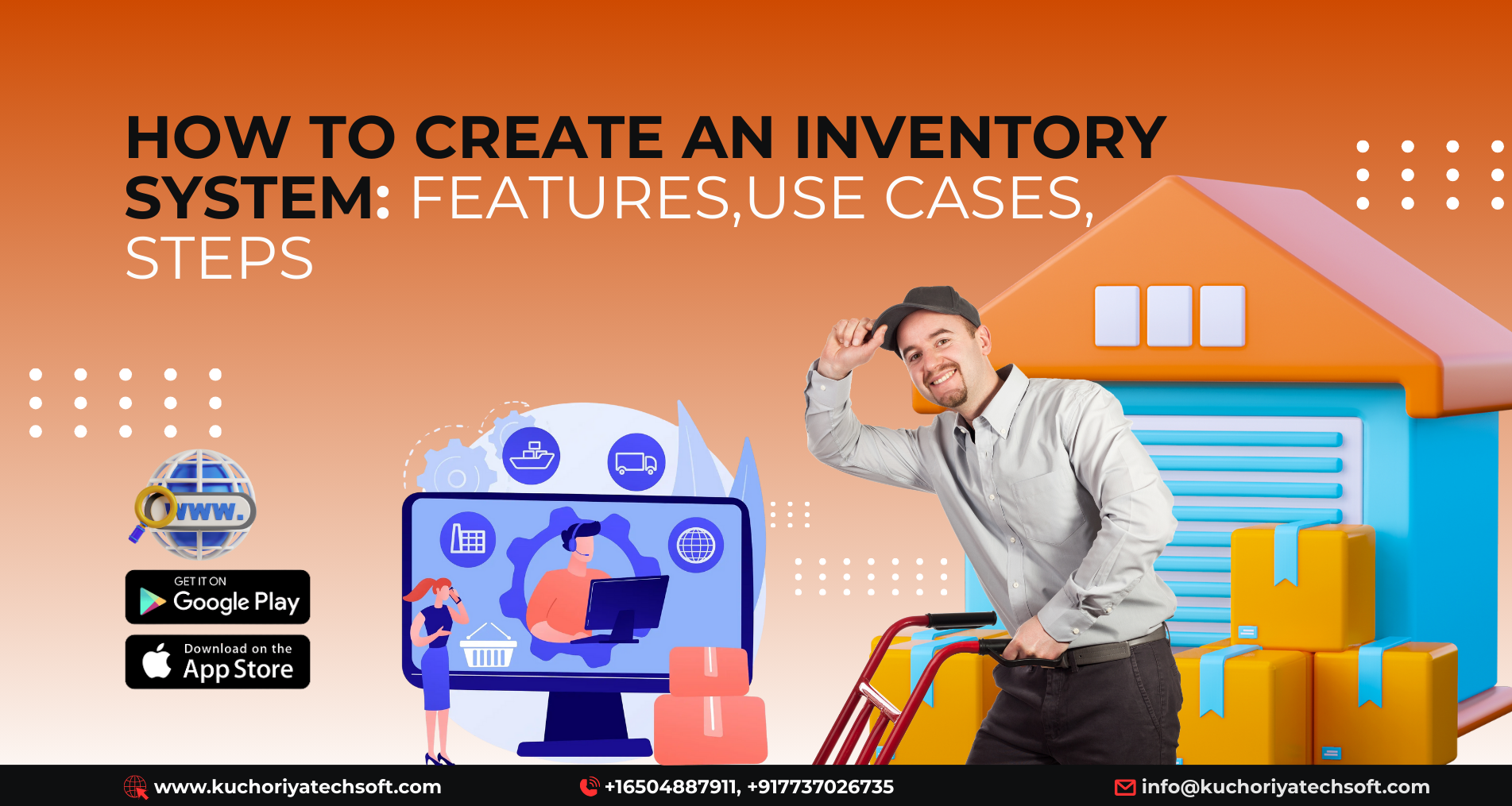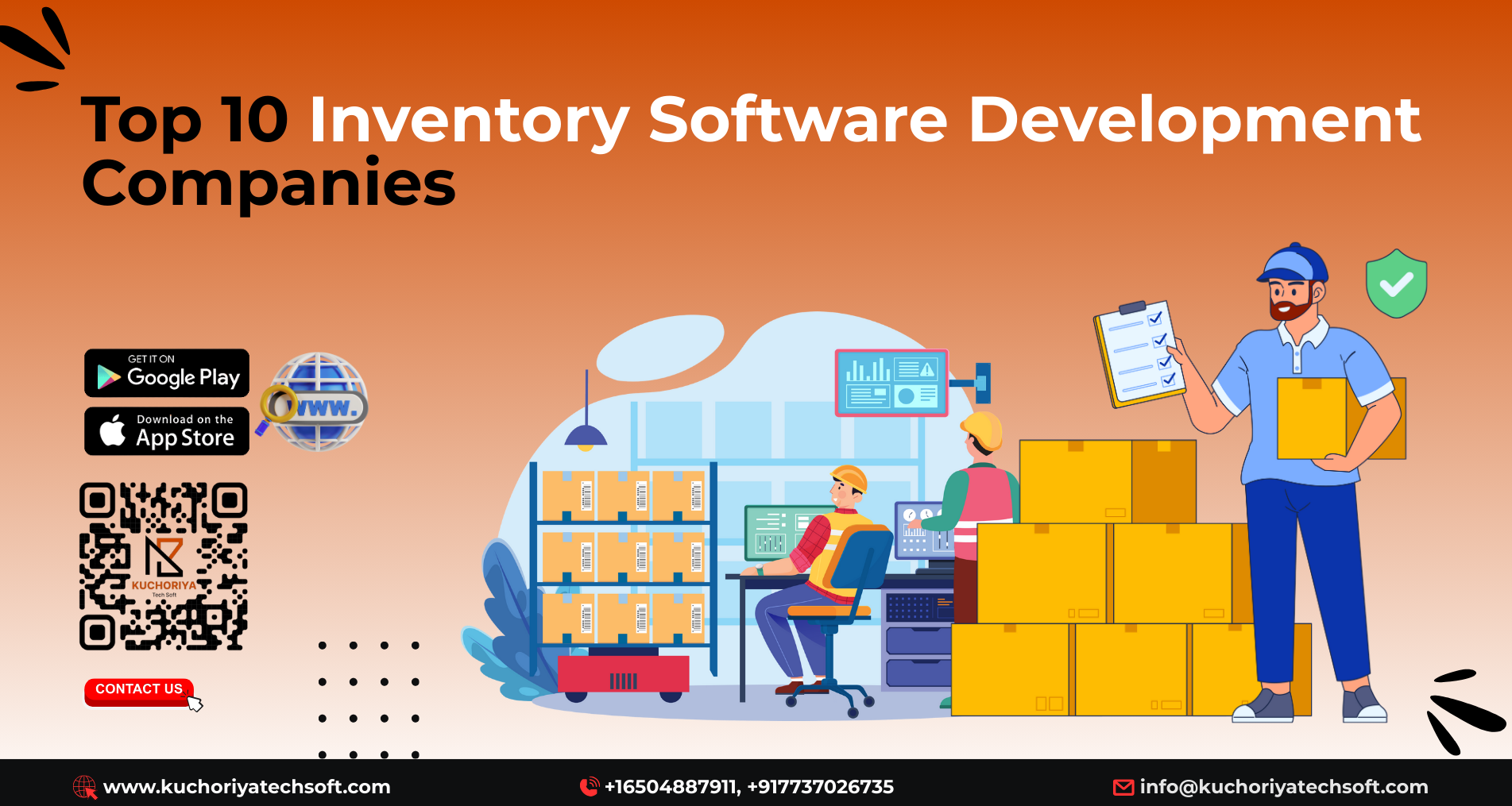How to Create an Inventory System: Features, Use Cases, Steps
In today’s hyper-connected, data-driven world, managing inventory efficiently isn’t just a backend task—it’s a strategic advantage. Whether you’re running a fast-growing eCommerce startup, scaling a manufacturing hub, or operating a global enterprise, having a smart, scalable inventory system development strategy can be the difference between profit and loss. At Kuchoriya TechSoft, we specialize in helping businesses build an inventory management system that aligns perfectly with their operations. In this ultimate guide, you’ll discover everything from must-have features and real-world use cases to modern technologies and a step-by-step roadmap. Learn how custom inventory software can optimize stock levels, reduce operational costs, and fuel sustainable growth.
Powering Business Efficiency with Smart Inventory Systems
What Is an Inventory System?
An inventory system combines software and hardware that helps businesses track, manage, and optimize their stock levels. It ensures companies maintain the right amount of stock at the right time, boosting efficiency, cutting costs, and supporting smooth operations. Modern solutions go beyond basic tracking with features like automation, analytics, and cloud synchronization.
Why Businesses Need Inventory Management Software
Without a dedicated inventory management application, companies risk overstocking, understocking, and unnecessary revenue loss. A custom inventory software solution empowers businesses with industry-specific features—automated workflows, real-time inventory tracking, seamless integrations, and personalized dashboards. Whether you're managing a warehouse inventory management system or a mobile inventory app, a smart inventory platform is key to sustainable scalability and operational control.
Types of Inventory Management Systems

Choosing the right inventory system is essential to streamline operations and improve accuracy. Inventory systems range from simple manual inventory systems to sophisticated AI-based inventory management systems and cloud inventory system development, each tailored to different business needs.
1. Manual Inventory Systems: Traditional methods using paper or spreadsheets, suitable for small businesses but prone to errors.
2. Automated Inventory Systems: Software solutions that automate tracking, reduce errors, and boost efficiency.
3. AI-Based Inventory Management System: This system leverages artificial intelligence for demand forecasting, stock optimization, and predictive analytics.
4. Cloud Inventory System Development: Offers real-time data access, scalability, and easy integration across multiple locations.
5. Centralized and Decentralized Inventory Systems: Centralized systems provide uniform control, while decentralized systems allow flexibility across branches.
6. ERP-Integrated Inventory Software: Combines inventory management with enterprise resource planning for seamless business processes.
7. Mobile and Cross-Platform Inventory Apps: Enable on-the-go inventory tracking via mobile devices and multiple platforms, improving accessibility.
Core Features of a Robust Inventory System
A successful inventory management system must be feature-rich and tailored to meet business demands. Here are the essential inventory management system features that ensure efficiency and accuracy:
- Real-Time Inventory Tracking Software: Live updates provided by inventory tracking system software reduce stockouts and prevent overstocking, enabling seamless stock control.
- Barcode & QR Code Scanning: An inventory system with barcode scanning boosts accuracy and speeds up stock handling processes.
- IoT-Enabled Inventory System: Using smart sensors, the IoT-enabled inventory system tracks stock movement, location, and environmental conditions in real time.
- AI and Predictive Analytics: An inventory system with data analytics leverages AI for demand forecasting, stock optimization, and predictive insights.
- Multi-Channel Management: Support for offline and online synchronization through mobile inventory apps or ERP-integrated inventory software ensures comprehensive control across sales channels.
- Inventory System Security Solutions: Robust inventory system security solutions protect sensitive data with encrypted, role-based access controls.
- Inventory Software UI/UX Design Services: A user-friendly corso user interface significantly improves productivity and ease of use for all inventory stakeholders.
Use Cases Across Industries
Inventory management systems serve as the backbone for operational efficiency across numerous industries. Here’s a comprehensive look at how various sectors benefit from modern inventory software and solutions:
1. Retail & eCommerce: Utilizing inventory tracking software integrated with POS and eCommerce platforms provides real-time synchronization of stock levels, reducing overselling and backorders while enhancing customer satisfaction.
2. Manufacturing: Through custom inventory system development services, manufacturers effectively manage raw materials, work-in-progress (WIP), and finished goods inventory, boosting production workflows and reducing downtime.
3. Warehousing and Logistics: Advanced end-to-end inventory management solutions combine GPS tracking, IoT-enabled inventory systems, and robotic automation to improve accuracy, streamline order fulfillment, and optimize storage.
4. Healthcare & Pharmaceuticals: Regulatory compliance and precise stock monitoring are critical; tailored inventory management system software ensures safety protocols are met, including temperature controls and expiry tracking.
5. Food & Beverage: Real-time inventory tracking software with automated spoilage alerts is essential for managing perishable goods, minimizing waste, and maintaining freshness.
6. Automotive & Electronics: Features like batch tracking, warranty management, and serial number control within inventory system development allow for better quality assurance and after-sales support.
7. Small Business & Startups: Affordable and scalable inventory systems for small businesses and mobile inventory management app solutions enable startups to monitor stock and sales efficiently without heavy upfront costs.
8. Construction & Heavy Equipment: Custom inventory software for businesses in construction helps track equipment, materials, and tools, reducing project delays and improving asset utilization.
9. Fashion & Apparel: With the help of cross-platform inventory apps, fashion retailers manage multi-location stock, seasonal trends, and online/offline sales channels seamlessly.
10. Food Delivery & Restaurants: Dynamic inventory management system software assists in ingredient tracking, supply replenishment, and real-time stock monitoring to ensure smooth kitchen operations.
11. Education & Libraries: Inventory software supports asset tracking, from books to equipment, improving resource allocation and maintenance.
12. Technology & IT Hardware: Inventory system integration services facilitate tracking of IT assets, software licenses, and hardware, ensuring timely upgrades and replacements.
13. Agriculture & Farming: IoT-enabled systems assist in managing seeds, fertilizers, equipment, and produce inventory with real-time monitoring and analytics.
Step-by-Step Guide to Creating an Inventory System

Step 1: Define Business Requirements
Start by analyzing your existing workflows. Whether you are a startup or a large enterprise, your system should be scalable.
Step 2: Choose the Right Tech Stack
Opt for frameworks that support AI, IoT, and cross-platform compatibility—especially if building a blockchain for an inventory management solution.
Step 3: Design the Data Architecture
This is where inventory management architecture comes into play. Define schemas, stock categories, and movement rules.
Step 4: Develop Core Modules
- Stock In/Out
- Purchase Orders
- Sales Orders
- Returns
- Vendor Management
Step 5: UI/UX Development
A beautiful Corso user interface boosts adoption and efficiency. Rely on professional inventory app development services for the best results.
Step 6: Integration
From e-commerce platforms to ERP systems, inventory system integration services make your software future-ready.
Step 7: Testing & QA
Use inventory management QA and testing protocols to ensure stability, security, and accuracy.
Step 8: Deployment & Training
Partner with a top-tier Inventory System Deployment Solutions provider for a smooth go-live.
Mobile & Cloud Inventory System Considerations
In today’s fast-paced digital landscape, mobility and cloud integration are vital. A robust cloud inventory system development strategy ensures high availability, seamless data recovery, and secure, anytime-anywhere access. Whether you're managing a warehouse, running a retail chain, or scaling a growing startup, mobile inventory management apps empower businesses with real-time inventory tracking software, offline syncing, and multi-location accessibility.
Modern businesses increasingly demand cross-platform inventory apps—a crucial component of any scalable inventory management system software—that support desktop, tablet, and smartphone environments. These solutions boost remote collaboration, improve data visibility, and enable faster, smarter decisions across distributed teams.
Technology Stack & Tools to Use
- Frontend: React, Angular with Inventory Software UI/UX Design Services
- Backend: Node.js, Python
- Database: PostgreSQL, MongoDB
- Mobile: Flutter, Kotlin
- Cloud: AWS, Azure
- Special Tech: AI/ML, IoT, Blockchain
Working with a custom OTT platform development team or an app development company in Dubai can help integrate inventory tools with media and logistics platforms.
Challenges and Solutions in Inventory System Development
Inventory system development comes with several obstacles that can hinder operational efficiency and scalability if not addressed properly. Below are common issues and their corresponding solutions using strategic technologies and services.
Common Challenges
- Data duplication leads to inaccurate stock levels and decision-making errors.
- Lack of real-time visibility affects demand forecasting and stock availability.
- Security breaches risk sensitive inventory and customer data.
- User resistance occurs due to a poorly designed inventory software UI/UX.
Proven Solutions
- Implement Inventory System Optimization Services to eliminate data inconsistencies and streamline workflows.
- Adopt inventory system security solutions to safeguard data with encrypted access and multi-factor authentication.
- Rely on professional inventory app maintenance and support to ensure system stability and minimal downtime.
- Invest in intuitive inventory software UI/UX design services to improve user adoption and reduce training time.
Hiring the Right Development Partner
Working with global experts matters. Here’s how you choose:
- App Development Company in Dubai for scalable web/mobile solutions
- Inventory Management System Developers in UAE
- Enterprise Inventory Software Solutions in Europe
- Best Inventory Software Developers in the USA
- Inventory App Development in Australia
- Top Inventory Management Experts in Spain
Need on-demand support? Opt for freelance inventory app developers, a dedicated inventory management team, or remote inventory software development services, depending on your project needs.
Inventory System Development Cost Breakdown
Here's a quick look at what it typically costs to develop an inventory system, depending on your business size and complexity:
1. Starter Plan (For Small Businesses)
Basic inventory management system with standard features like tracking, reporting, and mobile support.
💸 $5,000–$10,000
2. Growth Plan (For Mid-Sized Businesses)
Custom inventory software with integrations, barcode scanning, and real-time analytics.
💸 $10,000–$25,000
3. Enterprise Plan (For Large Organizations)
Advanced inventory solutions with cross-platform apps, AI-based forecasting, ERP integration, and multi-warehouse support.
💸 $25,000–$60,000
4. Custom Plan (Tailored to Your Business)
Need something unique like blockchain for inventory management or an IoT-enabled inventory system? Contact us for a personalized quote and consultation based on your requirements.
Future Trends in Inventory Management

As technology evolves, inventory systems are rapidly advancing to meet modern business demands. Here are the top innovations reshaping the future of inventory management:
1. AI-Powered Inventory Optimization: Next-gen systems use AI-based inventory management system capabilities to analyze trends, automate restocking, and minimize holding costs.
2. Voice-Activated Inventory Systems: Hands-free operations enhance efficiency, especially in warehouses and manufacturing. Integrated voice control features are becoming part of advanced inventory management applications.
3. IoT-Enabled Warehouse Management: The rise of IoT-enabled inventory system solutions enables real-time tracking of goods, storage conditions, and movement across facilities.
4. Blockchain for Transparent Supply Chains: Adoption of blockchain for inventory management ensures traceability, reduces fraud, and streamlines compliance across the supply chain.
5. Inventory Software for Digital Transformation: Companies are embracing inventory software for digital transformation to modernize operations, improve decision-making, and enhance agility in response to market dynamics.
Why Choose Kuchoriya TechSoft for Inventory System Development?
At Kuchoriya TechSoft, we don’t just develop software—we craft scalable, intelligent solutions that transform your inventory operations. As a leading inventory development company, we offer tailored services designed to meet the unique needs of businesses across the globe.
Our expert team specializes in:
- Remote inventory software development services for agile, location-independent deployment
- Offshore inventory system developers who deliver excellence at optimized costs
- Inventory software engineering experts with deep knowledge in cloud, AI, IoT, and blockchain integration
- Inventory app development consultants and a dedicated inventory management team for end-to-end project execution
- Flexible engagement through freelance inventory app developers and custom inventory development staffing services
We are globally recognized as:
- A top-rated inventory software company in the USA
- Trusted inventory management system developers in the UAE
- A reliable inventory system development company in Spain
- A go-to custom inventory software company in Canada
- Experts in inventory app development in Australia and enterprise inventory software solutions in Europe
From inventory project development company consulting to full-scale deployment, Kuchoriya TechSoft is your partner for smart, scalable, and industry-aligned digital transformation.
Partner with the Best Inventory System Development Company Today
Kuchoriya TechSoft is your trusted partner for inventory system development, offering custom inventory software solutions, inventory app development services, and inventory system integration services tailored for businesses of all sizes. Whether you need scalable enterprise inventory software solutions or a mobile inventory management app, our expert team delivers high-performance applications incorporating AI-based inventory management, blockchain, IoT, and cloud inventory system development.
As a leading global inventory software company, we provide end-to-end inventory system optimization, maintenance, security solutions, and QA testing. You can hire inventory software developers, outsource development, or engage with our dedicated inventory management team to build your ideal inventory system.
Contact us today to learn how we can help you build a powerful inventory management system. Request a quote to get started and become a referral partner to join our growing network of satisfied clients.
FAQs—Inventory System Development
Q. What’s the best way to build an inventory management system?
A. Start by defining your needs, choosing scalable tech, and partnering with an expert like Kuchoriya TechSoft. We offer custom inventory software for businesses of all sizes.
Q. How much does it cost to develop a custom inventory system?
A. The cost depends on features and scope. Our inventory system development cost breakdown includes UI/UX design, integration, testing, and deployment.
Q. Do you offer solutions for small businesses?
A. Yes, we build inventory systems for small businesses and startups, including mobile inventory apps and affordable cloud inventory system development.
Q. Is your inventory tracking software secure?
A. Absolutely. Our inventory system security solutions feature role-based access and encryption to keep your data safe.
Q. Can you integrate my ERP with the new inventory system?
A. Yes, our ERP-integrated inventory software ensures smooth syncing of your operations with zero disruption.
Q. Which industries do you serve?
A. We develop inventory software for retail, manufacturing, healthcare, logistics, and warehouse inventory management systems.
Q. How can I get started with your services?
A. Contact us or request a quote from Kuchoriya TechSoft today. You can also become a referral partner and earn rewards while we build your future-ready solution.
HIRE A TOP SOFTWARE DEVELOPMENT COMPANY
We are all over the world
United State
9765 keystone court, Clarence, NY 14031 , USA, +1 (650) 488-7911
Canada
1100 Caven St., Suite PH11, Mississauga, ON L5G 4N3 Canada , +1 (416) 726-4662, +1 (650) 488-7911
Brazil
Bispo César da Corso Filho, 1266, San Carlos, São Paulo, Boa Vista, Brazil, 13575-331
South Africa
12 IbisWay, Sunnydale Fish Hoek 7985 Western Cape, South Africa, +27824507091
Spain
The Fir Tree 119 El Olmillo Residential Area Loranca de Tajuña 19141 Guadalajara, Spain
UAE
Building A2 DDP - Dubai Silicon Oasis - Dubai - United Arab Emirates
Italy
Viale dell'Esperanto, 71, Formia, Italy, Lazio IT
Singapore
01-08 50 Ubi Cres, Ubi TechPark, Singapore, 408568
Hong Kong
Tower 2, Silvercord, Rm 907, 9F, 30 Canton Rd, Tsim Sha Tsui, Hong Kong
Australia
Unit 14G, 3 darling point road, darling point, Sydney, NSW, Australia, 2027
India
C-15, 1st floor, Mahalaxmi Marg, Behind World Trade Park, Malviya Nagar, Jaipur, Rajasthan - 302017




























